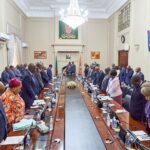In a scathing critique of Zambia’s governance and public sector, Diego Casilli and the Business Coalition Taskforce (BCT) have condemned the rampant theft of public resources, escalating bureaucracy, and the corruption plaguing the nation’s police forces. Their statements come in the wake of increasing concerns over the misuse of public funds, particularly within the health sector, as well as widespread police corruption affecting both citizens and international tourists.
The Looting of Health Care Funds
The BCT has voiced its alarm over the ongoing theft within Zambia’s health sector, emphasizing the detrimental impact of corruption and bureaucratic inefficiency. The coalition highlighted a disturbing case involving 61 containers of medicine found in privately owned warehouses. This discovery was part of a failed attempt to misappropriate funds from a USD 65 million procurement deal between Zambia and Egypt. Despite this revelation, BCT insists that corruption remains entrenched in the Ministry of Health and the Zambia Medicines and Medical Supplies Agency (ZMMSA).
Diego Casilli and the BCT have demanded accountability, citing the failure of various investigative bodies such as the Financial Intelligence Centre (FIC), which flagged fraudulent activities amounting to ZMW 61 billion (approximately USD 2.26 billion). These activities include tax evasion, illicit mining, and fraudulent trade operations, but little progress has been made in prosecuting those involved or recovering the proceeds of crime.
“Theft within the health sector undermines investments in this crucial area,” said Casilli. “Self-serving criminals, who seem above the law, continue to plunder resources meant for the health of Zambians.”
The situation has been compounded by the controversial procurement of USD 13 million worth of ambulances. Of the 156 units ordered, only 11 have been delivered, and the matter is now under investigation by the Anti-Corruption Commission (ACC). BCT has called for decisive action to address these systemic issues.
Police Corruption and Exploitation
The BCT has also taken aim at the corruption within Zambia’s police force, particularly the exploitation of tourists by traffic police. A widely publicized incident involved a group of tourists who were stopped multiple times on spurious charges, detained for hours, and forced to pay cash fines for their release. According to the Tourism Council of Zambia, this harassment is costing the country approximately USD 250 million (ZMW 7 billion) in lost revenue opportunities.
Zambia’s ranking in the World Internal Security & Police Index 2024 further underscores the severity of the issue, with the Zambian police force ranked 118 out of 125. The BCT has stressed that this situation is not an isolated incident but part of a broader, systemic pattern of abuse. Both local and foreign nationals are subjected to repeated exploitation, eroding trust in law enforcement and tarnishing Zambia’s international reputation.
“These incidents have become routine, and they are detrimental to both the tourism industry and the country’s image as a whole,” Casilli remarked. “The conduct of the traffic police is eroding the relationship between citizens and the state.”
The Failure of the Private Sector Dialogue Forum (PPDF)
The BCT has also raised concerns regarding the efficacy of the Private Sector Dialogue Forum (PPDF), an initiative originally designed to streamline business processes, reduce bureaucracy, and make it easier for Zambians to do business. Despite being in operation for three years, the BCT argues that the PPDF has become more bureaucratic and less effective over time.
“The PPDF was intended to reduce red tape and improve the business climate in Zambia,” Casilli explained. “Unfortunately, it has evolved into exactly what it was supposed to eliminate: a slow, cumbersome, and inefficient system that imposes new, more restrictive regulations on businesses.”
BCT claims that these regulatory challenges are putting Zambian businesses at a regional disadvantage, as they face higher costs and increased difficulty in navigating the system. The BCT also highlighted how entrenched civil servants are stifling practical concerns and advice from the private sector, which further hinders meaningful economic reform.
About Diego Casilli and the Business Coalition Taskforce
Diego Casilli is a prominent Zambian businessman and the founder of Napoli Property Investments Limited, managing upscale properties in Zambia, including Acacia Office Park and East Park Mall. He has a background in agriculture and property development, having previously overseen operations at Amanita, Zamanita, and Amagrain.
The Business Coalition Taskforce (BCT) is a non-political alliance of private sector businesses in Zambia. The coalition advocates for transparency, accountability, and the removal of systemic barriers that hinder economic growth. Focused on combating corruption, regulatory overreach, and bureaucratic inefficiency, BCT seeks to create a more conducive environment for investment and business development in Zambia.
As the situation in Zambia continues to unfold, Diego Casilli and the BCT are calling for urgent reforms and accountability to restore public trust and improve the business climate in the country.






